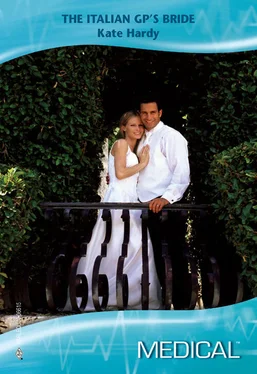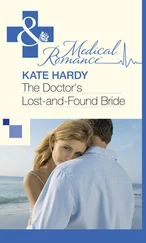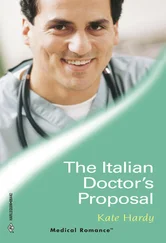“Call me,” Orlando said, his voice soft. He raised her hand to his mouth.
The brush of his lips against her skin was momentary. It was a mere courtesy, Eleanor knew—the Italian way of doing things. But there was heat in his eyes. Heat matched by the flicker of desire rising up her spine.
Calling him would be way too dangerous for her peace of mind, but she wasn’t going to argue over it now. Instead she smiled politely.
“Thank you for the lift, Dottore de Luca.”
“Orlando,” he corrected. “Prego.” He smiled, sketched a bow, ran lightly down the steps to his car and drove off….
Dear Reader,
I’ve always thought that the story behind those “lost loves” radio spots—where the presenter tries to put people back in touch with each other—would be a fabulous idea for a book. I’d also been talking about “secret baby” books with some author friends. Supposing my heroine discovered that she was the secret baby, and the first step on the trail to discovering her secret family was hearing something on the radio?
And so the idea for Eleanor’s story began.
Then there’s the book’s setting. It goes without saying that Italian men are gorgeous. (And have gorgeous voices. I adore hearing a good tenor sing in Italian). I’ve always adored Italy, and I’ve always wanted to visit Pompeii. So this book was just begging to be set in Naples. Add a gorgeous Italian doctor, plenty of lattes and gelati, and we’re talking utter bliss.
It takes Eleanor and Orlando a little time to realize that they’re destined to be together—and they have a few weepy moments—but I hope you’ll enjoy their journey as much as I enjoyed writing it.
I’m always delighted to hear from readers, so do come and visit me at www.katehardy.com.
With love,
Kate Hardy
The Italian GP’s Bride
Kate Hardy

www.millsandboon.co.uk
For Fi, with much love
(and thanks for the asparagus!)
CHAPTER ONE
CHAPTER TWO
CHAPTER THREE
CHAPTER FOUR
CHAPTER FIVE
CHAPTER SIX
CHAPTER SEVEN
CHAPTER EIGHT
CHAPTER NINE
CHAPTER TEN
CHAPTER ELEVEN
CHAPTER TWELVE
CHAPTER THIRTEEN
CHAPTER FOURTEEN
‘IF THERE’S a doctor on the plane, please could you make yourself known to the flight attendants by switching on the light above your head.’
The announcement that every doctor secretly dreaded. Especially on a plane, where space was so tight that it was difficult to work. Eleanor knew that the crew were trained in basic life support, so the problem was obviously something more complicated than that. They needed her help—her knowledge, her experience in emergency medicine. She switched on her light, and one of the flight attendants came over to her.
‘One of our passengers has collapsed. Would you be able to take a look at her, please?’ she asked in a low voice.
‘Of course,’ Eleanor said, keeping her voice equally low. She knew some people wouldn’t want to get involved, but she’d never stand by and leave someone needing medical help. And in a way this was going to help her, too: instead of spending the whole of the flight from London to Naples wondering just what she was letting herself in for and worrying that maybe she wasn’t doing the right thing, she had something to keep her mind occupied.
‘Oh—do you have any identification?’ The flight attendant swallowed hard. ‘Sorry, I should’ve asked you that first.’
‘No problem,’ Eleanor said. Either the flight attendant was new to the job, or the emergency was something that had thrown her. Eleanor really hoped it was the former. The cramped aisle of an aeroplane, several thousand feet up in the air and half an hour from an ambulance wasn’t the ideal place to deal with something major. ‘You need proof that I’m a qualified doctor.’ Luckily she kept her hospital ID card in her credit-card holder. She fished it out and showed it to the flight attendant, who looked relieved.
‘Would you come this way, please, Dr Forrest? One of my colleagues is fetching the emergency kit.’
Eleanor followed her up the aisle to where a middle-aged, plump woman was slumped in her seat. A quick check told her that the patient wasn’t breathing and didn’t have a pulse. She needed to get the woman flat and start CPR now.
‘Did she bang her head at all?’ she asked the woman seated next to her patient, who was sobbing.
The answer was a flow of Italian that Eleanor really couldn’t follow.
Ah, hell. The chances were that the patient hadn’t hit her head so there wasn’t a risk of a spinal injury, and right now the most important thing was resuscitation. Just as she was about to ask the flight attendant to find someone who could speak Italian and English, to translate for her and get some help in moving the woman so Eleanor could start giving CPR, a man made his way down the aisle, following another flight attendant.
‘Orlando de Luca, family doctor,’ he introduced himself. ‘May I help?’
His English was perfect, not halting in the slightest, though she was aware of his Italian accent. And he had the most beautiful mouth she’d ever seen.
Though now was absolutely not the time to be thinking about that. They had a patient to save. And right now she needed his skills—language as well as medical. ‘Eleanor Forrest, emergency registrar,’ she replied. ‘Thank you. Her pulse and respiration are flat, so we need to start—’
‘CPR,’ he finished, nodding.
Good. They were on the same wavelength.
‘I don’t speak much Italian. The patient’s travelling companion either doesn’t speak English or is too upset to cope in a different language. Can you ask her if our patient hit her head, is taking any medication or has any medical conditions?’
‘Of course. But first…’ He turned to the flight attendant who’d brought him to the patient. ‘We need your help, please, to fetch supplies. Do you have an Ambubag and a defibrillator? It should be kept with the captain.’
‘I’ll check,’ she said, and hurried away.
Then he spoke to their patient’s travelling companion in Italian much too rapid for Eleanor to follow, given the basic Italian she’d started learning two weeks before. The only word she could catch was ‘dolore’—what was that? Sorrow?
And then she heard him say ‘l’infarto’—it sounded close enough to ‘infarct’, she guessed, for it to mean ‘heart attack’. Usually if a patient was unconscious and there was no pulse, it meant a cardiac arrest—though it could also be a grand mal epileptic seizure.
As if Orlando had guessed what she was thinking, he said, ‘Our patient’s name is Giulietta Russo. She’s travelling back to Napoli—Naples—with her daughter Fabiola. Giulietta complained of a pain in her chest and then collapsed. No history of epilepsy, no history of angina, no other medical condition Fabiola can think of, and she didn’t hit her head when she collapsed.’
So far, so good. ‘Can you ask Fabiola if her mother has a pacemaker?’ she asked.
Another burst of rapid Italian. ‘No,’ he confirmed.
At the same time, Orlando and Eleanor moved the unconscious woman to the aisle and laid her flat. Gently, Eleanor tilted the patient’s head and lifted her chin so she could check the airways. ‘No sign of blockage. Airway’s clear.’ But the B and C of ‘ABC’ were a problem: Giulietta still wasn’t breathing and there was still no pulse: no sign of circulation.
‘Then we start CPR,’ Orlando said. ‘You bag and I do the chest compressions, yes? Five compressions to one breath?’
Читать дальше













